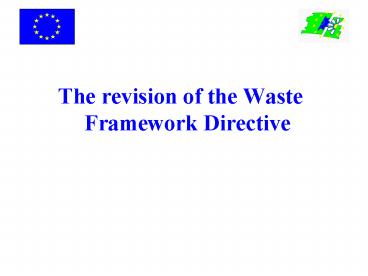The revision of the Waste Framework Directive - PowerPoint PPT Presentation
1 / 15
Title:
The revision of the Waste Framework Directive
Description:
Waste electric and electronic equipment. Dir.2002/95EC. Restriction of Hazardous ... Fitness for use: Meets market standards. Set a high environmental standard ... – PowerPoint PPT presentation
Number of Views:114
Avg rating:3.0/5.0
Title: The revision of the Waste Framework Directive
1
- The revision of the Waste Framework Directive
2
(No Transcript)
3
Objectives of the Waste Strategy
- Modernise by bringing new environmental thinking
into waste policy - Improve the regulatory environment, i.e. clarify
and simplify - Reinforce the waste recycling market
- Put prevention policies into action
4
Preparing the revision
- Expert workshop
- Member State meeting
- Detailed Member State questionnaire
- Stakeholder meeting
- Impact assessment work
5
Principles of the revision of WFD
- Appropriate level of ambition
- Leave elements that work untouched
- Modernise, simplify, clarify where useful
- Reinforce standards waste prevention
- (Hazardous Waste Waste Oil Dirs)
6
(No Transcript)
7
WFD Environmental Objective and Life Cycle
Thinking
- New environmental objective links waste to
life-cycle of resources - The main objective is to reduce environmental
impact - Objective guides waste management plans and waste
prevention programmes - Keeps waste hierarchy as a guiding principle
8
WFD Definition of Waste
- End of waste clarify through a waste stream
based approach - Other by-products guidelines on waste/by-product
in a Communication - Birth of waste re-use issues best tackled
through a practical approach
9
End of Waste Key aspects
Objectives of provision
Waste streams eligible
Set a high environmental standard Distinguish
between clean dirty recycled products Regulatory
relief for low risk products Facilitate the
internal market
Low environmental risk Potential environmental
benefit Genuine barrier Solid market for recycled
product
Framework conditions
Type of criteria
Governing 1) Objective of system 2) Type of
waste streams that can be included 3) Type of
criteria necessary 4) Cut off level for criteria
Environmental leaching, contamination and so
on Fitness for use Meets market standards
10
Interpretative Communication on by-products and
waste
- Business reality thousands of different types
of by-products/industrial residues with different
environmental impacts some waste, some not - Some evidence of uneven implementation and
confusion for economic operators - Commitment in Thematic Strategy on the prevention
and recycling of waste for 2006 - Explain legal situation, based on ECJ
jurisprudence, to the target audience
11
WFD - Recovery and disposal
- Recovery versus disposal
- General notion of recovery widened efficiency
criteria based approach where necessary - energy recovery factor for municipal waste
incinerators - Possibility to relegate operations
12
A Decade for Change
Non-haz waste landfills
Inc/co-inc emission limits
Final ELV targets
IPPC permits
2004 2005 2006 2007 2008 2009 2010
2015 2016
Hazardous waste landfills
Pckg targets
Final landfill diversion
PCBs destroyed
WEEE ELV targets
Landfill diversion
Landfill - Tyres Ban - Acceptance criteria
2005 Thematic Strategy
13
Developing Tomorrows Recycling policy
- Two clear conclusions
- 1) Previous approach (WEEE, ELV) has been useful
but cannot be extended indefinitely env
benefits would not justify the cost and
administrative burden. - 2) But market forces alone will not reach the
full environmental benefits of recycling for all
materials - In the short term pause to implement properly
what has already been agreed (see previous slide) - In the longer term re-evaluate the situation on
a material by material basis use full range of
tools
14
Putting Prevention into Action
- Framework approach based on subsidiarity
- Action at national and probably sub-national
levels - Agree on a list of actions to be considered by MS
- Targets and indicators at appropriate level
- Improve science and knowledge useful for waste
prevention - Environmental potential of prevention actions
- Assess against environmental objective
15
Next steps
- Council has had little negotiating time so far
but Leiden workshop shows that significant
consensus on many issues - EP due to vote in November
- Ecosoc, Committee of Regions calling for more
command and control based approach - Agreement on Directive 2008?































